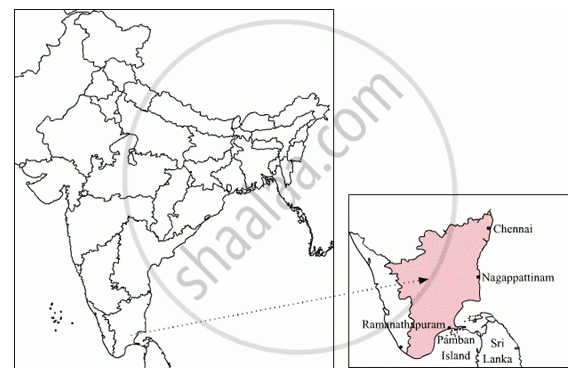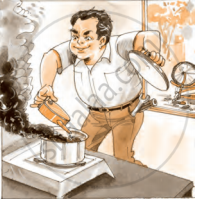Advertisements
Advertisements
प्रश्न
What does the child think about his/her teacher?
उत्तर
For the child, the teacher is an extraordinary or mysterious person.
APPEARS IN
संबंधित प्रश्न
Find the words in the text which show Ustad Bismillah Khan’s feelings about the items listed below. Then mark a tick (✓ ) in the correct column. Discuss your answers in class.
| Bismillah Khan’s Feelings about | Positive | Negative | Neutral |
|
1. teaching children music |
|||
| 2. the film world | |||
| 3. migrating to the U.S.A | |||
| 4. playing at temples | |||
| 5. getting the Bharat Ratna | |||
| 6. the banks of the Ganga | |||
| 7. leaving Benaras and Dumraon |
Answer following question in short.
Write the central theme of the poem.
Activity:
Find Dhanuskodi and Rameswaram on the map. What language(s) do you think are spoken there? What languages do you think the author, his family, his friends and his teachers spoke with one another?

The following are the dictionary entries for some of the words that appear in 'The Mystery of Bermuda Triangle'. Study the words and their meanings before you read the mystery for better comprehension.
• Halloween/halau in/ : the night of 31st October when it was believed in the past that dead people appeared from their graves. This is now celebrated in the US, Canada and Britain by children who dress as ghosts and witches.
• vector/'vekta/: an insect or animal which carries a disease from one animal or plant to another; a course taken by an aircraft; a quantity, such as velocity, completely specified by a magnitude and direction.
• crackle/' krak(a)l/: to make short sharp sounds .
• ascent/ a' sent/: the act of climbing or moving up .
• roger/' rod3a /: in communication by radio to show that they have understood a message; an expression of agreement.
• probe/praub/: to ask questions in order to find out some secret or hidden information; an exploratory action; expedition, or device, especially one designed to investigate and obtain information on a remote or unknown region.
• abduct/ ab' dAkt/ : to take somebody away illegally, by using force.
• time warp/ taimwarp /: a situation in which it is possible for people or things from the past or the future to move to the present.
• phenomenon/ fa' nomrnan/: a fact or an event in nature or society, especially one that is not fully understood.
• erratic/ I' rat.Ik/: not happening at regular times.
• engulf /In· g /\ If/,/ &n · g /\ If/: to surround or to cover somebody or something completely.
Some are Purple and gold flecked grey
For she who has journeyed through life midway,
Whose hands have cherished , whose love has blest,
And cradled fair sons on her faithful breast,
And serves her household in fruitful pride,
And worship the gods at her husband's side.
Read the lines given above and answer the question that follow:
What fulfills the life of an Indian wife and mother?
Read the following passage carefully and answer the questions that follow:
Richard Parker was so named because of a clerical error.
A panther was terrorizing the Khulna district of Bangladesh, just outside the Sundarbans. It had recently carried off a little girl. She was the seventh person killed in two months by the animal. And it was growing bolder. The previous victim was a man who had been attacked in broad daylight in his field. The beast dragged him off into the forest, and his corpse was later found hanging from a tree. The villagers kept a watch nearby that night, hoping to surprise the panther and kill it, but it never appeared.
The Forest Department hired a professional hunter. He set up a small, hidden platform in a free near a river where two of the attacks had taken place. A goat was tied to a stake on the river’s bank. The hunter waited several nights. He assumed the panther would be an old, wasted male with worn teeth, incapable of catching anything more difficult than a human. But it was a sleek tiger that stepped into the open one night: a female with a single cub. The goat bleated. Oddly, the cub, who looked to be about three months old, paid little attention to the goat. It raced to the water’s edge, where it drank eagerly. Its mother followed it. Of hunger and thirst, thirst is the greater urge. Only once the tiger had quenched her thirst did she turn to the goat to satisfy her hunger.
The hunter had two rifles with him: one with real bullets, the other with immobilizing darts. This animal was not the man-eater, but so close to human habitation she might pose a threat to the villagers, especially as she was with cub. He picked up the gun with the darts. He fired as the tiger was about to attack the goat. The tiger reared up and snarled and raced away. But immobilizing darts don’t bring on sleep gently—they knock the creature out without warning. A burst of activity on the animal’s part makes it act all the faster. The hunter called his assistants on the radio. They found the tiger about two hundred yards from the river. She was still conscious. Her back legs had given way and her balance on her front legs was shaky. When the men got close, she tried to get away but could not manage it. She turned on them, lifting a paw that was meant to kill. It only made her lose her balance. She collapsed and the Pondicherry Zoo had two new tigers. The cub was found in a bush close by, meowing with fear.
The hunter, whose name was Richard Parker, picked it up with his bare hands and, remembering how it had rushed to drink in the river, named it Thirsty. But the shipping clerk at the Howrah train station was evidently a man both confused and diligent. All the papers received with the cub clearly stated that its name was Richard Parker, that the hunter’s first name was Thirsty add that his family name was None Given. Richard Parker’s name stuck. I don’t know if the hunter was ever called Thirsty None Given!
(a) Give the meaning of each of the following words as used in the passage.
One word answers ob short phrases will be accepted.
- corpse (line 6)
- quenched (line 16)
- reared (line 20)
(b) Answer the following questions briefly in your own words.
- Why does the author say that the panther ‘was getting bolder’?
- Why did the Forest Department hire a professional hunter?
- What did the hunter expect to encounter? What did he actually encounter?
- What did the tiger do before turning to attack the goat? Why did it do that?
- Why did the hunter decide to shoot the tiger though he knew it was not the man-eater?
- What name did the hunter give to the cub? Why?
(c)
(i) In not more than 60 words narrrate how the hunter and his assistants captured the tiger and her cub.
(ii) Give a suitable title to your summary in 3(c). Give a reason to justify your choice.
The crocodile lay on the bank of the Limpopo river. Golu thought it was
Answer the following question.
What did the crocodile do to show that it was a real crocodile?
Answer the following question.
Where was the tiger cub hiding when Grandfather found him?
"Here comes someone running". Who has been referred to in this sentence?
Who is Mridu and with whom Mridu went to Rukku Manni’s place?
Which one of the following sums up the story best?
Why did Vijay Singh ask the ghost to accompany him to town next day?
How did the ghost make a plan to trick Vijay Singh finally?
The words given against the sentences below can be used both as nouns and verbs. Use them appropriately to fill in the blanks.
(i) The two teams have ____________ three matches already. (play)
(ii) The last day’s ____________ was excellent.
How did Jumman and Algu get over their bitterness and become friends again?
Read aloud the two paragraphs that describe the boy and the old man at the Lucky Shop.
What does the word ‘chasing in the extract mean?
Based on the following points write a story.
- Your aunt has gone to her mother’s house.
- Your uncle does his cooking.
- He is absent-minded.
- He puts vegetables on stove
- He begins to clean his bicycle outside.
- The neighbour calls out saying something is burning.
- Your uncle rushes to the kitchen.
- To save vegetables, he puts some oil in them.
- Unfortunately, it’s machine oil, not cooking oil.
- What do you think happens to the vegetables?

Begin like this: Last month my aunt decided to visit her parents...
What does Nishad find out about Mr Nath from Ramesh?
Arrange the information as suggested below.
- What he eats
- When he eats
- What he drinks and when
- How he pays
